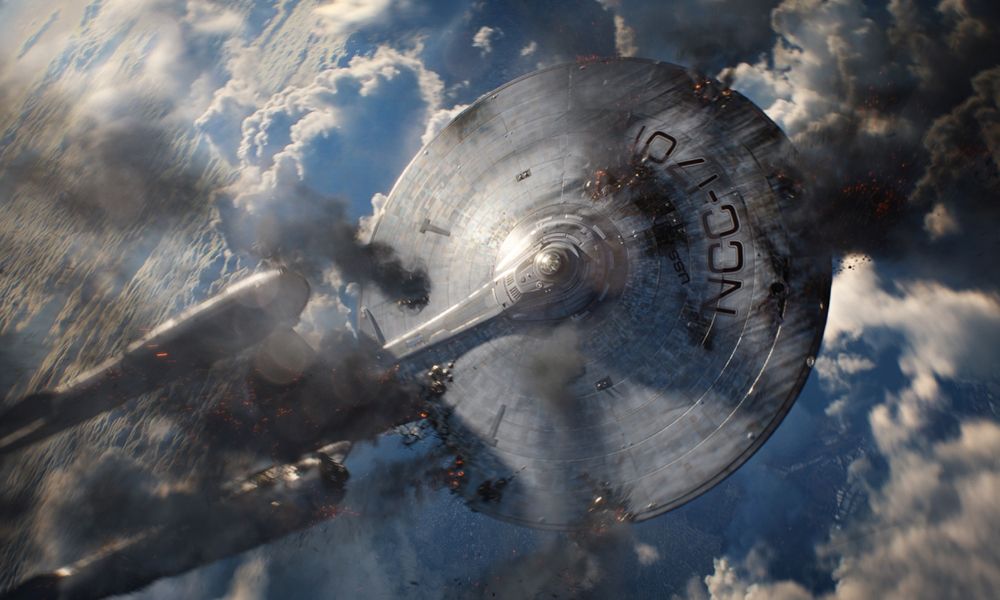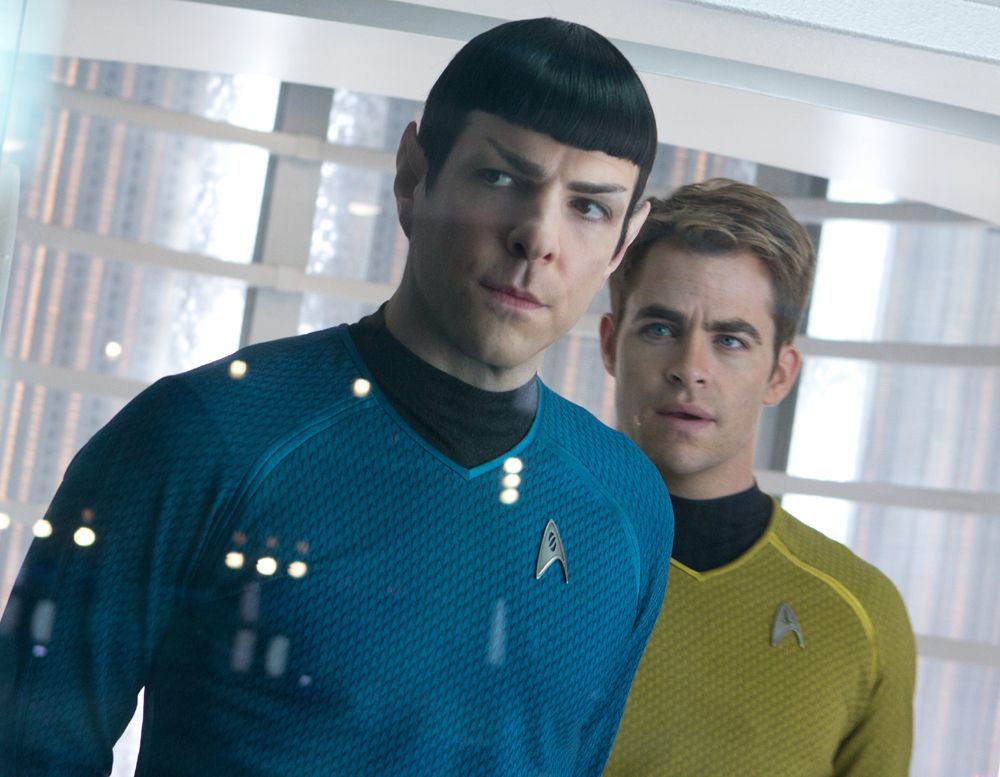A lot of things explode in Star Trek: Into Darkness: London, Starfleet, ships, torpedoes, Klingons and, at one point, a guy's head (technically, we only hear his skull crack, but we're meant to imagine the gore). The question buzzing around the Internet right now, and raised by Spinoff’s own Katie Calutti, is whether this Star Trek franchise, under the guidance of J.J. Abrams, has become more about nifty explosions and less about exploring strange new worlds with a cast of interesting people. Scotty asks the question straight out: "A military organization? Is that what we are now?"
Warning: Spoilers for Star Trek Into Darkness follow.
The film is supposed to be an allegory for the pre-emptive strikes launched after 9/11, and Into Darkness is dedicated to the veterans who fought in wars after those attacks were carried out. So while Khan (Benedict Cumberbatch) is supposedly the movie's big villain, he’s really only reacting to the movie's ultimate villain, Admiral Marcus.
Marcus, who wants a more militarized Starfleet, complete with drones, mega-warships and all-out war with the Klingons, uses Khan to build his might. When Khan goes rogue and starts blowing stuff up, Marcus sends Kirk and Spock on a suicide mission to cover his tracks. It's a not-at-all-veiled metaphor for the justifications the Bush administration made in the march to wars in Afghanistan and Iraq.
Unfortunately, metaphor and allegory are different. A metaphor is a simple "this is like that" equation, while allegory comes from the Greek "to speak different." Allegory requires that you have something important to say, and have hidden it behind signs and symbols. While Into Darkness gives us an effective metaphor for the wages of total war, it's unclear what we're supposed to make of all this fuss. Abrams asks a bunch of questions, but he never really allows his characters to fully explore them. It's not that I need to be told what to think about drone strikes, but there isn't enough room between explosions to hear why Kirk is initially for them, and Spock is dead-set against them. Star Trek goes into darkness, but forgot to bring its flashlight.
Watching this film, I was reminded of two episodes of Star Trek that deal with dark themes: The Next Generation's fantastic "Yesterday's Enterprise," and Deep Space Nine's "In the Pale Moonlight." In "Yesterday's Enterprise," a temporal rift causes the Enterprise C to jump forward in time and change Starfleet's future. We witness what Starfleet would be if peace had never come between the Klingons and the Federation. The Enterprise is a military vessel, and the Federation is in a constant state of war. We learn self-sacrifice is the key to peace, and that without it we are all lost. "In the Pale Moonlight" follows Captain Sisko's thought process as he attempts to win the Romulans as allies against the Dominion. Sisko is pushed into doing immoral things to secure victory, and is deeply disturbed by his own actions. The episode asks whether every sacrifice is worth making -- particularly if it means sacrificing your own moral code.
Those two episodes are far deeper, far richer than anything Abrams has brought to the screen. They represent what Star Trek has always meant to me: Very good people floating in a tiny ship in a strange part of space, forced to make decisions based upon their own moral judgment. Big space battles don't even enter into it.
Of course, if you’re going to make a Trek film, you do have to put in a few space battles. It's a fine line between ratcheting up the action to make a story movie-worthy and glorifying violence. Gene Roddenberry famously objected to increased militarization in Star Trek II: The Wrath of Khan. Unfortunately for him, however, Khan really works as a Trek movie: The violence had been building since Khan was introduced in "Space Seed." Plus, Leonard Nimoy's Spock and William Shatner's Kirk are trusted men; we know their capacity for self-sacrifice, and their desire to do good. When Nimoy tells us the needs of the many outweigh the needs of the one, we honestly don't believe him. When Chris Pine gets to play the same scene in Into Darkness, I found myself thinking, "Oh, let him die, it'll give him a dose of humility."
There is a look that all captains have that Pine hasn't quite mastered -- it's a weird blend of self-doubt and self-assuredness that happens when they have to do something morally abhorrent, but also entirely correct. On Shatner, it's a slight curl of the lip. On Stewart, it's a nostril flare. On Janeway, a narrowing of the eyes. And on Sisko, it's usually pounding the table and hurling a baseball across the room.
A Star Trek hero needs enough of a beat to give us that look, to tell us that this big explosion coming up deserves our boos as well as our applause. That no act of violence is to be taken lightly, no matter how awesome it looks. That look is the signal that we should trust our captain, that we should forge ahead anyway. A lot has been made of the new military uniforms, the new weapons, all the military might that has been added to the Trek universe. But to me, it's the missing element that matters: Without characters who feel genuine, and genuinely driven by a moral compass, it's hard to follow anyone Into Darkness.



